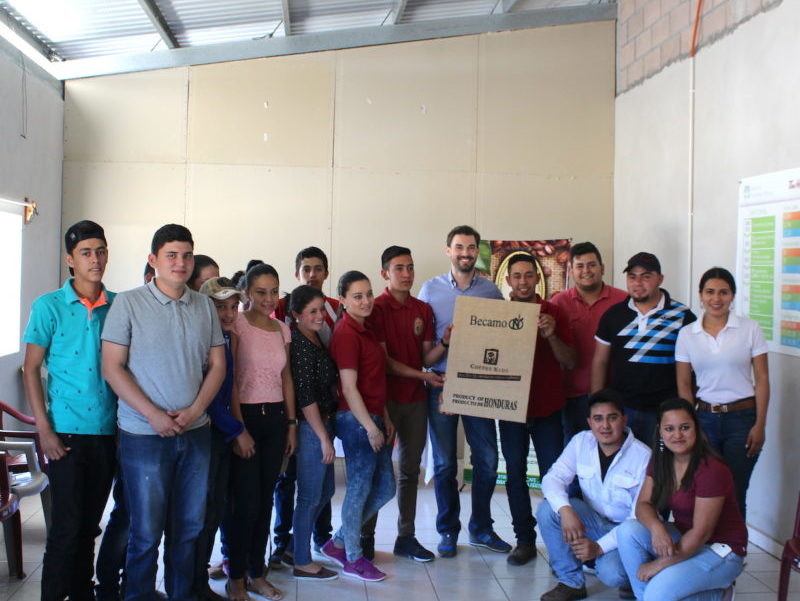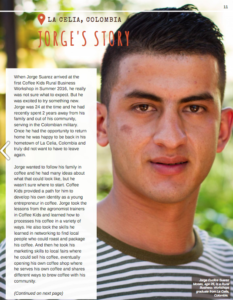Honduras’ bright future is perhaps most evident in conversations with its youngest producers.
“I can’t remember when I last experienced such a positive energy at origin,” says Florian Benkhofer, CEO of InterAmerican Coffee, recounting a recent afternoon in Ocotepeque, Honduras, with Coffee Kids.
Established 27 years ago, Coffee Kids is a nonprofit dedicated to helping young producers to reach their potential. Today, its primary supporter is HRNS, the independent nonprofit established by the Neumann family; it employs more than 250 people and has partnered with more than 200,000 coffee-farming families in more than 400 coffee communities across Africa, Asia and Latin America.

InterAmerican CEO Florian Benkhofer and participants in the Coffee Kids program in Western Honduras.
In Honduras, Coffee Kids is reaching young farmers through UNIOCAFE, an association that supports 28 producer organizations in Western Honduras. Producers between the ages of 13 to 34 who are interested in joining the program — which focuses on life skills, small business best practices and agricultural strategies — apply and sign up for the usually 28-month program, and they receive a stipend while they participate.
Many of them start out farming a portion of a family farm, and in some cases they’re later put in charge of the entire enterprise. Program graduate Jorge Benitez, for example, began managing his father’s farm, Las Peñitas, and last year won second place in the Honduras Cup of Excellence.
Programs like Coffee Kids offer empowerment to a generation that’s unlike any that’s come before it—and that’s facing challenges that are likewise brand new.
In its 2017 annual report, Coffee Kids shares the additional example of Jorge Suarez, a young person in La Celia, Colombia, who after finishing his military service knew he wanted to follow his family into coffee, but wasn’t sure how. Coffee Kids helped him find a path forward, and today he’s not only a successful producer but has opened a coffee shop where he serves his coffees and shares new ways of brewing with his community.
“This new generation has an entirely new mindset,” says Florian. “They can educate themselves—they’re on Facebook, on YouTube, they’re connecting with other farmer groups. Even the dynamic of the meeting was nothing like what most of us are used to. They were super outspoken, asking lots of questions, debating a lot. It was just fantastic.”
He continued, “Not once during my visit did anyone mention that they hope to move to the city or to the U.S., which one used to commonly hear. These kids see a great future in coffee in Honduras, and they understand that the opportunity is in producing the best quality possible.”

In its 2017 annual report, Coffee Kids shared the story of program participant Jorge Euclice Suarez Motato.
Empowerment Coffee
In July, InterAmerican introduced a Youth Empowerment Coffee — a coffee blend from 22 young farmers in the program. It’s creamy and delicate, has notes of cardamom, caramel, milk chocolate and bright citrus, and for every pound purchased, InterAmerican gives back $0.10 to the project and its farmers.
After the success of that coffee, InterAmerican is excited to increase our support and bring in two containers from Coffee Kids in Honduras this year. Additionally, we’ll be meeting with Coffee Kids in Colombia in May, and we’re exploring the possibility of supporting the group there, as well as in Guatemala.
“It’s so fun to be speaking with a young producer about the crop season — and then also about the hashtags he’s using!” Florian laughs. “They’re so savvy and connected, and the opportunities they have, and the communities they’re connecting with, are so different from what their parents had.”
“These producers can of course sell to whomever they’d like,” he continued, “so we’re very, very happy to be working with them, and we hope to help the program expand into more regions. Thanks to social media, and the willingness of these young people, we’re getting to engage with our producer partners in a really wonderful way that was never possible before.” •